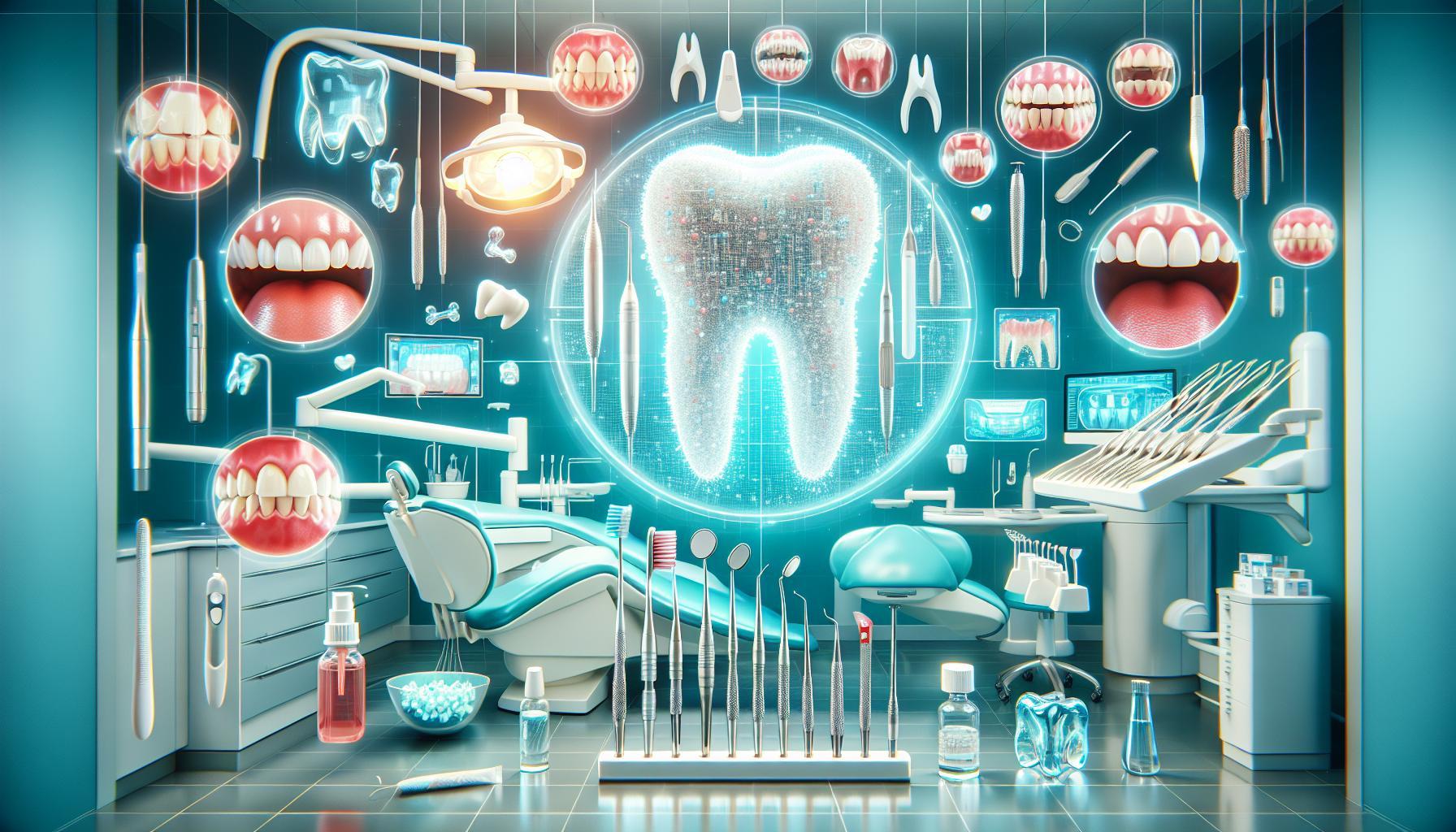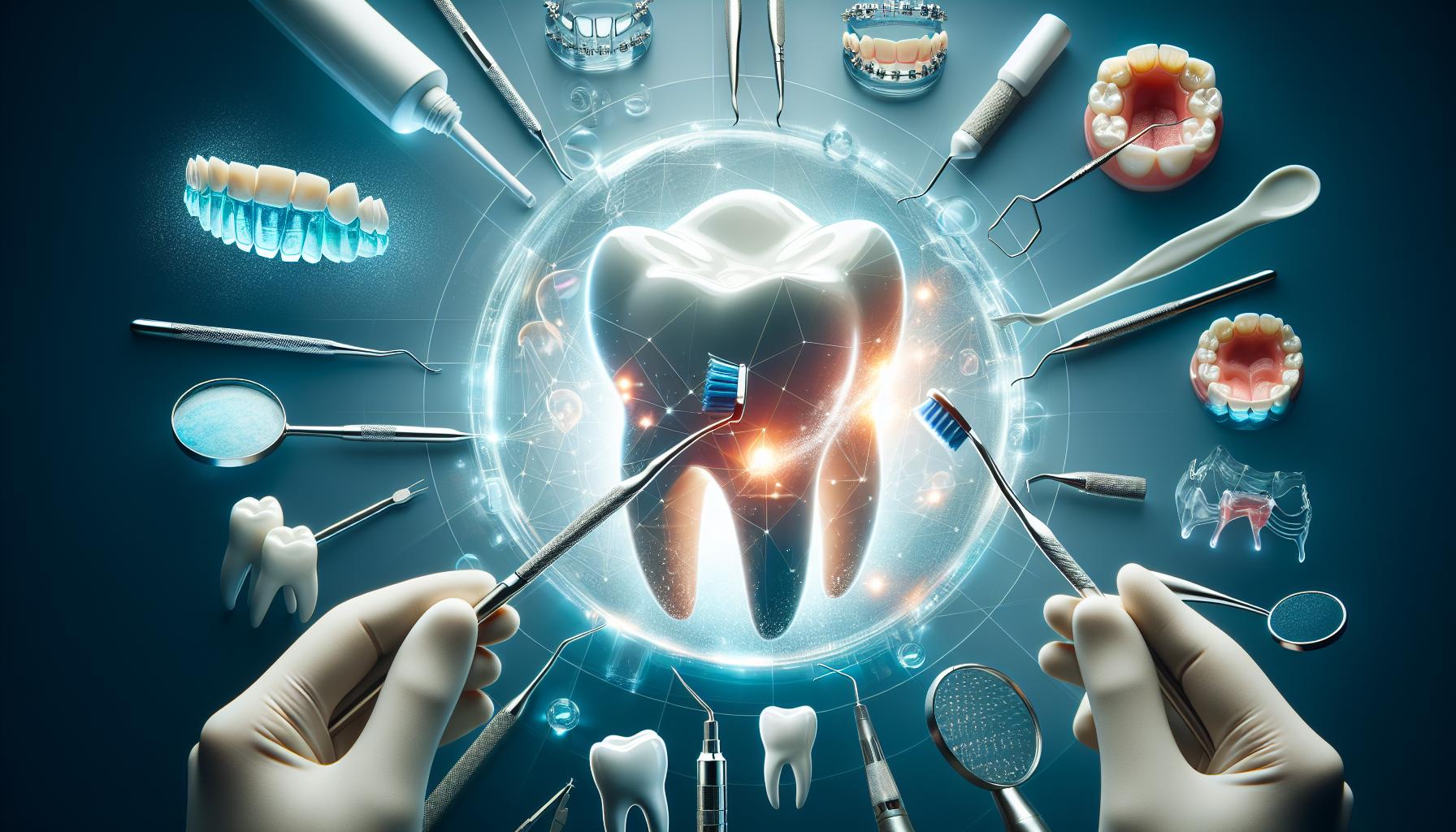
Many people wonder if brushing their teeth just once a day is sufficient for maintaining optimal oral health. This question is crucial as dental hygiene practices substantially impact overall well-being. While some advocate for a two-minute routine twice daily, it’s essential to explore the benefits and drawbacks of less frequent brushing to understand its implications for your smile and health.
Understanding the Basics: Why Dental Hygiene Matters
Dental Hygiene: A Cornerstone of Oral Health
Did you know that maintaining good oral hygiene can significantly reduce your risk of developing chronic diseases? Research has shown that poor dental hygiene not only affects your teeth and gums but can also lead to complications like diabetes, heart disease, and respiratory issues. This connection emphasizes the importance of understanding the fundamentals of dental care, including the common question: Is it okay to brush your teeth once a day? the answer lies in the broader context of dental hygiene practices.Despite the questions surrounding whether brushing once a day is sufficient,experts agree that frequent brushing and flossing are key components of effective oral hygiene. brushing twice daily helps to remove plaque—a sticky film of bacteria that builds up on teeth and can lead to cavities and gum disease. when we consider the upsides and downsides of less frequent brushing, it becomes evident that consistently maintaining oral hygiene should be a priority. Engaging in routine dental check-ups and cleaning sessions, such as those offered at accredited dental hygiene programs, is also essential for professional guidance and preventative care.
- Prevent Gum Disease: Regular brushing prevents the buildup of plaque that can lead to gingivitis and more severe periodontal diseases.
- Fresh Breath: Daily brushing,especially after meals,keeps your breath fresh by minimizing bacteria in the mouth.
- Aesthetic Appeal: Maintaining a bright smile through regular brushing can enhance self-confidence and social interactions.
While the inquiry into brushing frequency is valid, it’s equally significant to engage in complete dental hygiene practices. Understanding that brushing alone isn’t enough empowers individuals to take charge of their oral health. those interested in pursuing a career in dental hygiene, such as through programs at institutions like Cypress College and West Los Angeles College, can gain essential knowledge and skills to advocate for oral health in their communities.
Equipped with appropriate education and practices, you can contribute to a culture of proactive dental care that benefits both individual and public health—a vital takeaway especially in discussions around Is it okay to brush your teeth once a day? Pros and Cons.
The Case for Once-a-Day Brushing: Key Benefits
Brushing your teeth just once a day may seem counterintuitive, but for some, it can offer compelling advantages without drastically compromising oral health. While the American Dental Association (ADA) recommends at least twice daily brushing, the reality of busy lifestyles may make this challenging. Understanding why some opt for once-a-day brushing can provide insight into its potential benefits.
One of the primary advantages of brushing once daily is the reduced risk of over-brushing, which can lead to enamel wear and gum recession. Gentle, effective brushing is crucial for maintaining healthy teeth, and for many individuals, doing so once a day, preferably at night, allows sufficient time to protect tooth enamel without the abrasiveness that can occur from excessive brushing. In fact, meticulous brushing once a day can still prevent the buildup of plaque as long as it is done thoroughly and with the right technique[1[1[1[1][2[2[2[2].
Another notable benefit is the potential for more consistent dental routines. Focusing on a single brushing session can help individuals establish a more manageable daily practice, particularly when combined with other hygiene methods like flossing and using mouthwash. This consistency enhances the efficacy of the routine and encourages individuals to maintain their dental health without feeling overwhelmed by the number of tasks involved in oral care[3[3[3[3].
Moreover, brushing once a day paired with a fluoride toothpaste can still provide considerable protection against cavities and gingivitis. Fluoride works to strengthen enamel and combat decay, making a nightly routine especially beneficial when brushing is consistently performed.Additionally, limiting brushing to once a day can promote better attention to technique, ensuring that brushing is not rushed, which can frequently enough happen when trying to fit in two sessions[2[2[2[2].
while the debate about the necessity of brushing twice a day persists, there are valid reasons why brushing once may work for some people. It emphasizes the importance of quality over quantity, promoting effective oral hygiene without the potential downsides of overcare.
The Drawbacks of Brushing Once Daily: potential Risks
Brushing your teeth is basic to maintaining oral health, but can brushing only once a day lead to potential drawbacks? Many people wonder if a once-daily brushing routine is sufficient. While this approach may seem convenient, it can pose several risks that could undermine your dental hygiene efforts.
The Risks of Insufficient Brushing Frequency
Brushing just once a day might not adequately combat the buildup of plaque and bacteria that accumulate throughout the day. When you consume food and drinks, particularly those high in sugars and acids, bacteria thrive and form plaque. If left unchecked, this plaque can harden into tartar, leading to gum disease and cavities. According to dental professionals, the majority of people benefit significantly from brushing their teeth twice a day, as this routine ensures that harmful substances are removed promptly before they cause lasting damage.
Impact on Gum Health
One of the significant risks associated with brushing only once daily is the potential development of gum disease. Insufficient brushing can lead to softer gum tissue becoming inflamed and receding, exposing sensitive areas of teeth that may lead to increased pain and sensitivity. Brushing twice daily helps remove plaque before it can irritate the gums and cause inflammation. Consider these key points when evaluating your brushing routine:
- Inflammation Risk: Less frequent brushing can increase inflammation and the risk of gingivitis.
- Higher Cavity Rates: Inadequate plaque removal may lead to a greater incidence of cavities.
- Long-Term Dental Issues: Over time, gum disease can lead to tooth loss and other severe health complications.
Long-Term Consequences of minimal Brushing
Neglecting proper dental hygiene practices can have long-lasting implications beyond just oral health. Emerging research suggests that poor oral hygiene is linked to broader systemic health issues, such as heart disease and diabetes. For individuals brushing only once a day, understanding this relationship is crucial.
To foster a more effective dental hygiene routine and minimize risks associated with brushing less frequently, consider the following actionable steps:
| Action | Benefit |
|---|---|
| Brush Twice Daily | Prevents plaque buildup and reduces gingivitis risk. |
| Floss Daily | Removes food particles and plaque between teeth. |
| Use Antimicrobial Mouthwash | Kills additional bacteria lingering in the mouth. |
while brushing your teeth once a day may seem adequate, the associated risks could outweigh the benefits. Adopting a more comprehensive dental care routine, which includes brushing twice daily, can significantly enhance oral health and prevent long-term complications.
How Often Should You Really Brush? Expert recommendations
Understanding the ideal Frequency for Brushing your Teeth
Many people may be surprised to learn that simply brushing your teeth once a day might not be enough to maintain optimal oral health. Dental experts generally recommend brushing at least twice a day—once in the morning and once before bed. According to the American Dental Association (ADA), brushing your teeth regularly is essential for removing plaque and preventing cavities. When it comes to the question, “Is it okay to brush your teeth once a day? Pros and Cons,” the answer is nuanced and deeply rooted in individual dental health needs.
- Twice Daily Brushing: Most dental professionals recommend a routine of brushing twice a day. This frequency is vital for effectively removing food particles and plaque that can accumulate throughout the day and during sleep.
- Time Matters: Each brushing session should last at least two minutes,allowing adequate time to clean all surfaces of the teeth thoroughly.
- Technique is key: Proper brushing technique is crucial. Using gentle, circular motions and ensuring you target hard-to-reach areas can make a significant difference in your oral hygiene.
When once-a-Day Brushing Might Be Acceptable
Though brushing twice daily is the gold standard, there are exceptions where brushing once a day can be sufficient, particularly in specific circumstances. for individuals with a heightened risk of cavities or gum disease, dentists often emphasize the necessity of sticking to a twice-daily routine. However, if you are experiencing temporary conditions that prevent brushing twice—such as illness or certain treatments—consulting your dentist for tailored advice may be a practical step.
Here are a couple of takeaways on when brushing once a day could be manageable:
| Condition | Recommended Action |
|---|---|
| Illness (e.g.,cold,flu) | Maintain once-daily brushing; focus on oral rinses and hydration |
| Recent dental procedures | Follow dentist’s recommendations for care,which may include limited brushing |
Ultimately,the decision to brush your teeth once a day or more should be made in consultation with a dental professional who can provide guidance aligned with your specific oral health needs. Understanding the implications of your brushing habits can aid in maintaining a healthy smile and ensuring that you don’t fall into the pitfalls associated with infrequent brushing. Regular visits to your dentist will also help monitor your oral health and adjust your routine as necessary,keeping the question,”Is it okay to brush your teeth once a day?” contextually relevant to your unique situation.
Finding the Right Balance: Additional Oral Care Practices
Enhancing Your Routine with Complementary Oral Care Practices
Did you know that effective oral hygiene extends beyond just brushing your teeth? While the debate around “is it okay to brush your teeth once a day?” is essential, integrating additional oral care practices can significantly enhance your overall dental health. Various methods play a crucial role in preventing dental issues and ensuring your mouth stays healthy and fresh.
- Flossing: Flossing should be a non-negotiable part of your oral care routine.It helps remove plaque and food particles trapped between teeth that a toothbrush simply cannot reach. Aim to floss at least once a day,ideally before brushing. This practice not only reduces the risk of cavities but also enhances gum health.
- Rinsing: Using an antibacterial mouthwash can effectively reduce plaque buildup and fight bad breath. Look for mouthwashes that contain fluoride, as they can also help strengthen enamel and prevent decay.
- Regular Dental Check-ups: No matter how diligent you are at home, professional cleanings and check-ups every six months are crucial. Dentists can identify early signs of problems that you might overlook, ensuring that your oral care routine aligns with your specific needs.
Incorporating these practices into your daily routine will not only support your brushing habits but also address the lingering concerns about the pros and cons of brushing your teeth once a day.Such as, if you brush only once daily, pairing that with thorough flossing and rinsing can effectively mitigate some of the risks associated with less frequent brushing.
| Oral Care Practice | Benefits | Recommended Frequency |
|---|---|---|
| Flossing | Removes plaque and food particles between teeth | Once daily |
| Mouthwash | Reduces plaque buildup, freshens breath | Once or twice daily |
| Dental Check-ups | Professional cleaning and early problem detection | Every six months |
Emphasizing these complementary practices is critically important when considering the balance between effectiveness and convenience in your oral hygiene. Addressing the core query—“is it okay to brush your teeth once a day?”—it’s evident that while it may suffice under certain circumstances, supplementing with these additional methods will optimize your oral care while minimizing potential drawbacks. Make it a habit to engage in these practices consistently for a healthier, brighter smile!
Listening to Your Mouth: signs You Might Need More Frequent Brushing
Recognizing the Need for More Frequent Brushing
Your oral health is frequently enough a reflection of your brushing habits. If you’ve ever noticed that your mouth feels off, it might be time to pay closer attention to your brushing routine. While the customary advice of brushing twice a day is widely accepted, some signs might indicate that you should consider brushing more frequently. just like any routine, adapting to your body’s needs can enhance your oral hygiene effectiveness.
- Persistent Bad Breath: If you find that your breath remains unpleasant despite your regular brushing, it could signal that food particles and plaque are accumulating. This buildup can contribute to bad breath and requires more frequent brushing to manage effectively.
- Increased Plaque Buildup: Visible yellow or brown spots on your teeth are often signs of plaque accumulation. If you’re noticing this between your routine cleanings,adjusting to more frequent brushing might help you keep plaque at bay.
- Bleeding Gums: If your gums bleed when you brush, it may indicate inflammation due to inadequate cleaning. More frequent brushing, combined with proper techniques, could alleviate this condition and improve your gum health.
- Food Sensitivities: If you frequently experience discomfort or sensitivity to hot, cold, or sugary foods, an increase in brushing could help remove residues that irritate your teeth and gums.
Real-World Submission: Adjusting Your Routine
Consider the lifestyle and dietary choices that influence your oral health.For instance, those indulging in a high-sugar diet might find that brushing after every meal helps ward off cavities. Similarly, individuals who smoke or consume alcoholic beverages may require more robust oral hygiene practices to combat the constant assault on their enamel.
Moreover, keep in mind that the quality of your brushing technique plays a crucial role in your oral health. Using the right toothbrush and dental products is essential. For instance, incorporating an antibacterial mouthwash can complement your brushing routine, especially if you’re considering if it’s okay to brush your teeth once a day from the viewpoint of managing plaque and freshening breath.
Table: Signs You Might Need more Frequent Brushing
| Sign | Recommended Action |
|---|---|
| Persistent Bad Breath | Brush after meals; consider using mouthwash. |
| Increased Plaque Buildup | Brush more frequently; floss daily. |
| Bleeding Gums | Brush gently and increase frequency; consult a dentist. |
| Food Sensitivities | brush after consuming irritating foods; use desensitizing toothpaste. |
By listening to your mouth and adjusting your brushing habits accordingly, you can enhance your oral hygiene and tackle issues before they escalate.An essential part of the discussion surrounding whether it is indeed okay to brush your teeth once a day involves recognizing these signs and tailoring your routine to fit your individual needs.
Practical Tips for Effective One-Time Brushing
While many dental professionals recommend brushing twice a day, some may wonder whether there are benefits to brushing just once daily. If you’re committed to making your one-time brushing effective, adopting strategic practices can optimize your dental health while simplifying your routine.
Choose the Right Time
Timing is crucial for maximizing the benefits of brushing your teeth once each day.Many experts suggest brushing just before bedtime,as this allows you to remove food particles and plaque that accumulate throughout the day. Not only does this practice help prevent overnight bacterial growth, but it also minimizes the risk of cavities and gum disease caused by sugary snacks or beverages consumed in the evening.
Use a Quality Toothbrush and Toothpaste
To make the most out of your single daily brushing, investing in a high-quality toothbrush and fluoride toothpaste is essential. Opt for a soft-bristled brush to avoid damaging your gums while effectively cleaning your teeth. Fluoride toothpaste strengthens enamel and helps prevent decay, which is particularly important when brushing less frequently.
- Toothbrush Type: Soft bristles are gentle yet effective.
- Toothpaste: Look for fluoridated options to enhance cavity protection.
Develop a Thorough Technique
When brushing once a day, it’s vital to ensure your technique is comprehensive. Brush all surfaces of the teeth: the outer, inner, and chewing surfaces. Spend at least two minutes brushing, and consider using a timer or playing a song to keep you on track. Don’t forget to gently brush your tongue,as this can help eliminate bacteria and freshen your breath.
Supplement Your Routine
In addition to brushing, consider integrating mouthwash and floss into your daily oral hygiene routine. Mouthwash can reach areas that brushing might miss,providing additional protection against plaque and bad breath. Flossing helps to remove food particles and plaque build-up between teeth, offering a more well-rounded approach to dental care.
| Oral Hygiene Method | Benefits |
|---|---|
| Brushing | Removes plaque and prevents cavities |
| Flossing | Eliminates debris between teeth |
| Mouthwash | Additional plaque management and fresh breath |
By implementing these , you can maintain your oral health even if you choose to brush your teeth only once a day. Understanding the pros and cons of less frequent brushing will allow you to make informed decisions about your dental routine—ensuring you can enjoy lasting health and a bright smile.
Exploring Other Factors: Diet, Habits, and Their Impact on Dental Health
Diet and lifestyle choices are crucial components of maintaining robust dental health. While daily brushing is essential, it’s equally critically important to recognize how what we consume and the habits we cultivate can significantly influence the health of our teeth and gums. The interplay between diet and oral health is intricately linked; understanding this relationship can empower individuals to make informed choices that bolster their dental well-being.
the Sugar Connection
Research consistently shows that high sugar intake is a major contributor to dental caries (tooth decay). According to findings from the American Dental Association, populations consuming free sugars at levels exceeding 10% of their total energy intake exhibit a higher incidence of caries than those with lower sugar consumption [[1]](https://www.ada.org/resources/ada-library/oral-health-topics/nutrition-and-oral-health). this highlights the importance of reducing sugar-laden foods and beverages in our diets. Making conscious choices to limit sugary snacks and drinks not only helps in preventing tooth decay but also aligns with the World Health Organization’s recommendations to keep free sugars below 10% of total energy intake for improved health outcomes [[1]](https://www.ada.org/resources/ada-library/oral-health-topics/nutrition-and-oral-health).
Acidity and Its Effects
Another critical aspect of diet relates to acidity. Acidic foods and drinks pose a distinct risk to our enamel, making it vital to moderate their consumption. Items like citrus fruits, sodas, and wine can erode tooth enamel, thereby increasing the vulnerability of teeth to decay and sensitivity [[3]](https://www.dentalhealth.org/diet-and-my-teeth). By understanding which foods can harm enamel, individuals can take proactive measures such as rinsing with water after consuming acidic substances or opting for less abrasive alternatives.
Positive Dietary Choices
On the flip side, incorporating a variety of nutrient-rich foods can enhance dental health. Foods high in calcium, phosphorus, and vitamins, such as leafy greens, dairy products, and nuts, contribute positively to oral health. As an example, higher vegetable consumption has been shown to correlate with lower levels of dental caries, indicating a protective effect against decay [[2]](https://pmc.ncbi.nlm.nih.gov/articles/PMC7551577/). By prioritizing a balanced diet filled with these essential nutrients, individuals can support their dental health alongside their brushing habits, reinforcing the question of whether brushing once a day is sufficient.
| Food Type | Impact on Dental Health |
|---|---|
| Sugary Snacks | High risk for tooth decay due to fermentation by bacteria. |
| Acidic Drinks | Contribute to enamel erosion, increasing sensitivity and decay risk. |
| Calcium-rich Foods | Strengthen enamel; reduce risk of caries. |
| fruits & Vegetables | Help maintain oral hygiene; may protect against caries. |
By understanding these dietary influences on oral health, individuals can refine their eating habits and consider how they integrate these insights with brushing practices. Balancing effective oral hygiene, like brushing once a day, with nutritious dietary choices can lead to better overall dental health and well-being.
Frequently Asked Questions
Is it Okay to Brush Your Teeth once a Day?
Brushing your teeth once a day has become a common practice for many, but it raises an important question: is it sufficient for maintaining good oral health? While some studies suggest that brushing once daily can be better than not brushing at all, it may not provide the optimal protection against cavities and gum disease that twice-daily brushing offers. The general suggestion by dental professionals,including the American Dental Association,is to brush at least twice a day for a full two minutes each time. This practice removes plaque buildup and food particles effectively,significantly reducing the risk of oral health issues[2[2[2[2].
there are pros and cons to brushing once a day. On the one hand, if time is a constraint, brushing is better than skipping it altogether. though, brushing only once may lead to more bacteria growth and plaque buildup during the day, which could lead to dental complications like cavities and gum disease over time[1[1[1[1]. Ultimately, while you might mitigate risks by brushing once in the morning or at night, incorporating that second daily brushing can enhance your overall oral hygiene and health.
What Are the Benefits of Brushing Twice a Day?
Brushing your teeth twice a day comes with numerous benefits that contribute to better oral health. Firstly, this practice helps remove food particles and plaque that accumulate throughout the day. The American Dental association emphasizes that using a soft-bristled toothbrush and fluoride toothpaste effectively protects against tooth decay and gum disease[2[2[2[2].
By brushing twice daily, you also promote fresher breath. Morning brushing eliminates odors caused by bacteria growth overnight, while evening brushing removes food debris, thus reducing bad breath in the long run. Additionally, establishing this routine can set a positive precedent for lifelong oral hygiene habits, encouraging better health practices overall. The cumulative effect of these small efforts greatly improves both your dental health and overall well-being.
Can I Rely on Mouthwash if I Only Brush Once a Day?
While mouthwash can be a helpful tool for maintaining oral hygiene, it should not be considered a replacement for brushing. Mouthwash, particularly those containing fluoride, can help reduce bacteria and freshen breath, but it doesn’t remove plaque and debris as effectively as brushing. The mechanical action of a toothbrush plays a critical role in disrupting and removing plaque from the teeth[3[3[3[3].
For individuals who brush only once a day, mouthwash can complement your oral care routine. Though, it’s crucial to use it as an addition rather than a substitute. Look for alcohol-free mouthwashes to avoid drying out your mouth, which can lead to more bacteria growth. Ultimately, while mouthwash is beneficial, the best practice remains brushing your teeth twice daily for optimal dental health.
What Should I Do If I Forget to Brush at Night?
If you forget to brush at night, there’s no need to panic. It’s important to remember that while a missed brushing can contribute to plaque buildup, it’s the consistent habits that matter most in dental care. If this happens, you might consider rinsing your mouth with water or mouthwash to help remove some particles and freshen your breath[3[3[3[3].
To prevent forgetting,try establishing a nightly routine that includes brushing as an integral part of winding down for bed. Keeping your toothbrush and toothpaste in a visible location or setting a reminder on your phone can serve as helpful cues. Building this habit is essential for maintaining oral health and combatting potential issues from infrequent brushing. Remember, one missed brushing is just that: one missed brushing, and it’s what you do consistently that shapes your dental health.
How Can I improve My Brushing Technique?
Improving your brushing technique can dramatically enhance your oral hygiene. Start by holding your toothbrush at a 45-degree angle to your gums. This angle allows the bristles to reach between your teeth and under the gumline, where plaque often builds up.Use gentle, circular motions rather than harsh back-and-forth scrubbing, which can damage your gums and enamel[1[1[1[1].
Be sure to brush for at least two minutes, ensuring you give attention to each quadrant of your mouth. It can be helpful to mentally divide your mouth into sections and spend about 30 seconds on each. Additionally, don’t forget to brush your tongue, as bacteria can accumulate there and contribute to bad breath. Regularly replacing your toothbrush, or using an electric toothbrush with a built-in timer, can also help maintain effective brushing habits and adjust your technique for maximum benefit.
Wrapping Up
conclusion: Is It Okay to Brush Your Teeth once a Day?
brushing your teeth once a day can be a practical choice for many, but it comes with both advantages and disadvantages. Here are the key points to consider:
Pros of Brushing Once a Day:
- Time-Saving: Reduces the time spent on oral hygiene, which can be appealing for busy lifestyles.
- Easier to Maintain: for those who struggle with establishing a routine, one daily brushing session can be more manageable.
Cons of Brushing Once a Day:
- Plaque Buildup: Brushing only daily may lead to an increase in plaque and bacteria, risking dental health.
- Potential for Cavities: Less frequent brushing can contribute to a higher risk of cavities and gum issues.
Understanding the impact of your brushing habits is crucial for your oral health. While brushing once a day might be sufficient for some, dental professionals often recommend twice a day for optimal care.
Explore More
We encourage you to further explore best practices for your oral hygiene routine. Consider the benefits of electric vs. manual toothbrushes and the importance of dental check-ups. Your smile deserves the best care possible, so don’t hesitate to engage with additional resources and tips to enhance your dental health!








